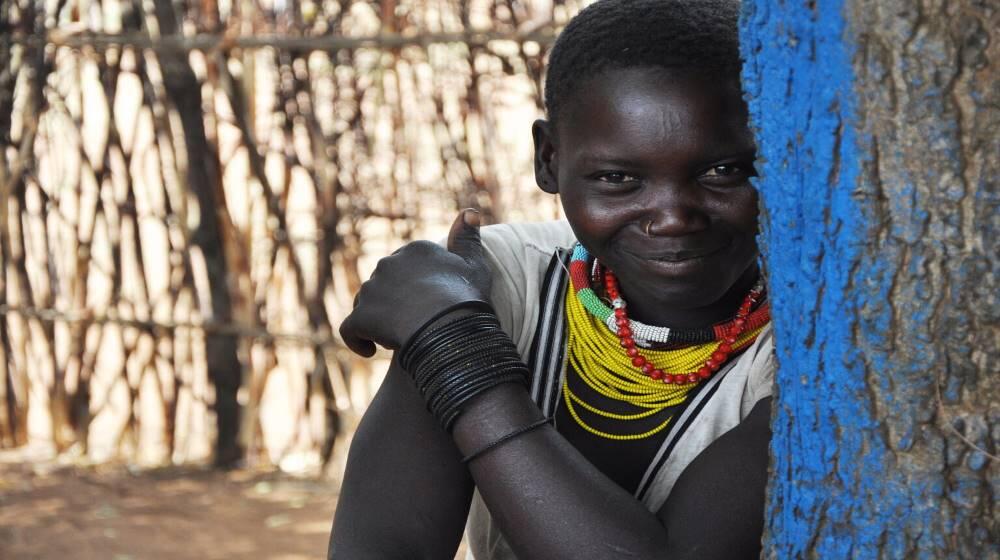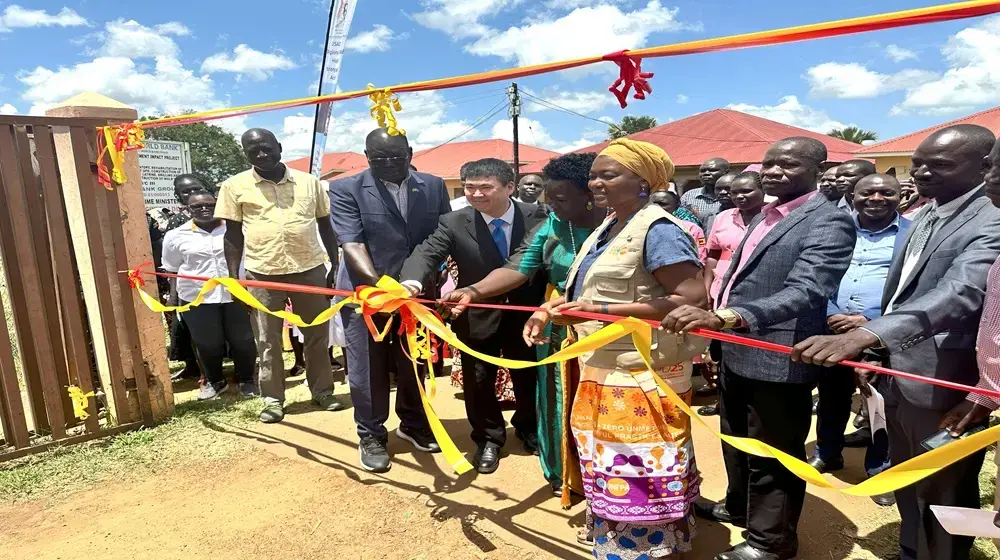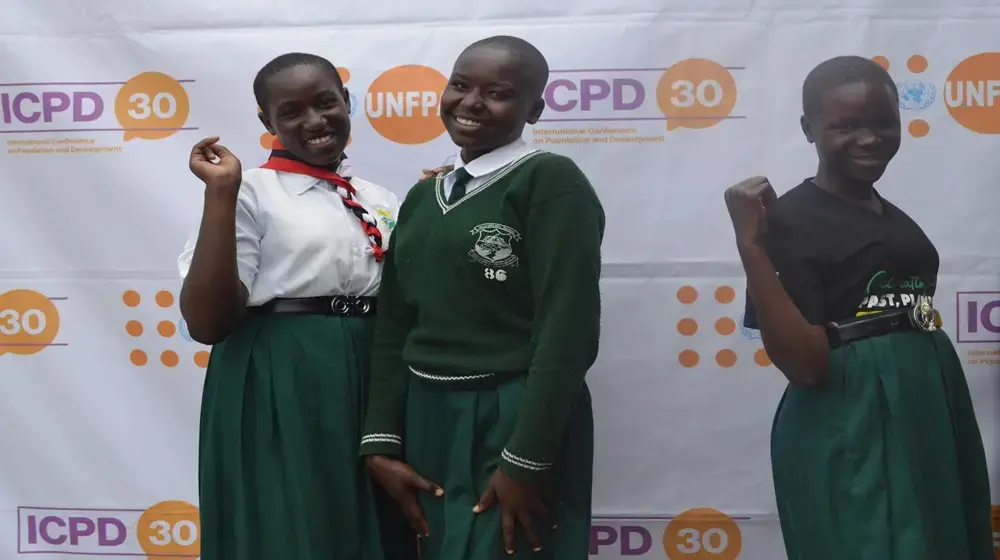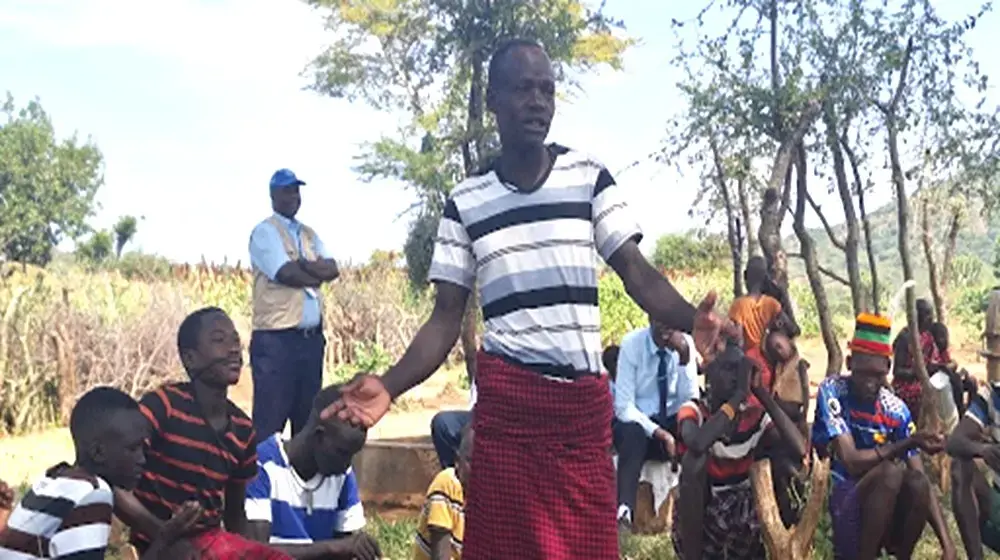
KAMPALA, 3 December 2021 - Today, the Government of Uganda in partnership with the United Nations Population Fund (UNFPA) and the United Nations Children’s Fund (UNICEF) is launching a national campaign to address defilement, child marriage, teenage pregnancy, and promote positive parenting. The national campaign is spearheaded by three women in high level leadership in Uganda namely: The First Lady of the Republic of Uganda, Hon. Janet Kataaha Museveni, Her Excellency the Vice President of the Republic of Uganda Maj (Rtd) Alupo Jessica R.E., and the Prime Minister of the Republic of Uganda, Rt. Hon. Robinah Nabbanja.
Amidst COVID-19 pandemic that has escalated vulnerabilities of young people, especially the girl child, the national campaign will engage Ugandans in a structured social dialogue to create awareness about defilement, child marriage, teenage pregnancy and positive parenting and agree on sustainable solutions.
In addition, relevant Ministries, Departments and Agencies (MDAs), and all Local Governments (LGs) will be directed to take the necessary action to address defilement, child marriage, teenage pregnancy and promote positive parenting in line with the law.
Teenage Pregnancy and Child Marriage in Uganda
This analysis was conducted by the National Population Council (NPC), the Uganda Bureau of Statistics (UBOS), and National Planning Authority (NPA), with support from UNFPA in the context of Uganda’s main strategy for harnessing the demographic dividend. On the backdrop that Uganda’s aspiration to reach middle upper income status is built around ensuring that young people are healthy, properly educated and appropriately skilled to take up jobs that will be created in the economy as per the third National Development Plan (NDP III) programme layout. The cornerstone of this strategy is rapid fertility decline, arising mainly from young people delaying marriage and childbirth as they complete their education and build careers, which will trigger the age structure transformation and in turn effect harnessing of the demographic dividend. Teenage pregnancy and child marriage will undermine this strategy in so many ways if no action is taken.
Magnitude of teenage pregnancy
Teenage childbearing has existed in Uganda for several decades. The percentage of women age 15-19 who have given birth or are pregnant with their first child declined between 2001 and 2006 from 31% to 25%, and has remained since stable at 24% in 2011 and 25% in 2016. The 2020 National survey on violence revealed that over the last 45 years, more than half of the girls have experienced childhood sexual abuse which may also explain the unchanging level of teenage pregnancy.

Social cost of teenage pregnancy on the individual
Education attainment: Teenage mothers are more likely than non-teenage mothers to attain only primary level education and on the other hand, teenage mothers are six times less likely to complete secondary education compared to non-teenage mothers. Therefore, keeping girls in school reduces teenage pregnancies.
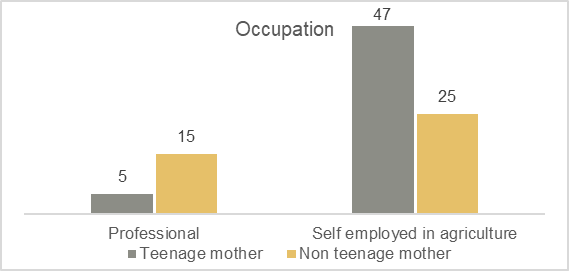
Occupation: Teenage mothers are three times less likely to have professional jobs and twice more likely to be self-employed in agriculture. About half of the teenage mothers (47%) are peasants in subsistence agriculture. Only 5% of the teenage mothers are employed in professional occupations. Subsequently teenage mothers will have a lower income level that eventually affects their standard of living and contribution to productivity.
Social effects of teenage pregnancy at Macro level
Contribution to the newborns and the Population: Teenage pregnancy is responsible for nearly one-fifth (18%) of the annual births in Uganda. Nearly half (46%) of the births by the teenagers were unwanted pregnancies.
Contribution to Infant and maternal mortality: Teenage pregnancy contributes 20% of the Infant deaths in Uganda and on the other hand contribute to 28% of the maternal deaths. If no action is taken to reduce teenage pregnancy, teenage mothers may continue to suffer the most from deaths arising.
Economic cost of teenage pregnancy
Individual level health care costs: Per capita reproductive health expenditure i.e what each teenage mother, therefore spends is 280 USD on herself and baby’s health care. Per capita expenditure for minor health care of a child per episode is estimated at UGX 29,645 (8 USD).
Macro level health care costs: Families of all teenage mothers in 2020 spent UGX1.28 trillion (290 million USD) on sexual reproductive health services and the estimated health facility expenditure on teenage mothers was UGX 246.9 billion (70 million USD). Collectively this is equivalent to 43% of the Ministry of Health 2019/20 budget. The largest amount of expenditure is spent on normal delivery and care of newborns.
Macro level education costs: Projections show that families of all teenage mothers in Uganda in 2020 will spend UGX 689.9 billion (194 million USD) on children born in 2020 to complete secondary education by 2038.
Expected Health care and education savings at Macro level
If the current teenage pregnancy rate is reduced from 25% to 15% as targeted in the current National Development Plan (III) and 10% in the Health Sector Development Plan. Consequently, each year:
- About half of the health care expenditure for teenage mothers will be saved equivalent to UGX 592 billion (169 million USD) and, the per capita health care expenditure will reduce from 280 USD to 105 USD.
- The resultant education cost for children born by teenage mothers of over UGX 53 billion (14.9Milion USD) will be saved.
If no action is taken to reduce childhood sexual abuse
- Teenage pregnancy will continue with 50% of teenage girls at risk each year.
- About 64% of teenage mothers will not complete primary education level.
- About 60% of teenage mothers will end up in peasant agriculture work.
- Annually more than UGX. 645 billion (181.8 Million USD) will be spent by Government of Uganda on healthcare for teen mothers and education of their children.
The national campaign to address defilement, child marriage, teenage pregnancy, and promote positive parenting will target every stakeholder including MDAs, parents and guardians, political leaders, religious leaders, cultural leaders, community leaders, development partners, private sector, civil society organizations, academia, the media, young people, and the general public.
The campaign pillars

The national campaign will use three pronged approach: prevention of teenage pregnancy; provision of social protection to teenage mothers; and provision of social protection to the babies born to teenage mothers.
Take action now! Join the campaign to ‘protect the girl, save the nation’.

